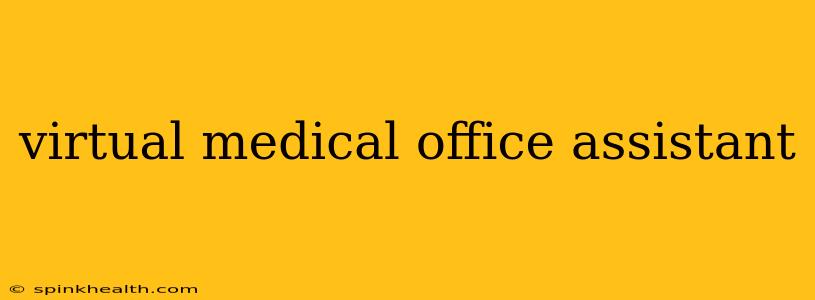The world of healthcare is evolving rapidly, and at the heart of this transformation is the rise of the virtual medical office assistant (VMOA). Imagine a world where administrative tasks are streamlined, patient communication is seamless, and your medical practice runs more efficiently – that's the power of a VMOA. This isn't just about technology; it's about building a more patient-centric and productive healthcare environment. Let's delve into the exciting possibilities.
What Exactly is a Virtual Medical Office Assistant?
A VMOA is a technology-driven solution that automates and simplifies numerous administrative tasks within a medical practice. Think of it as your dedicated, always-on, virtual employee handling everything from scheduling appointments and managing patient records to sending reminders and handling billing. Unlike a traditional employee, a VMOA operates 24/7, eliminating the constraints of working hours and improving response times. It's a game-changer for improving efficiency and patient experience.
How Can a VMOA Improve My Practice's Efficiency?
This is where the real magic happens. A VMOA frees up valuable time for your medical staff, allowing them to focus on what they do best: providing quality patient care. Imagine the difference:
- Reduced administrative burden: No more manual scheduling, endless phone calls, or tedious data entry. A VMOA handles it all.
- Improved appointment scheduling: Patients can book appointments online at their convenience, reducing no-shows and maximizing clinic utilization.
- Enhanced patient communication: Automated reminders, appointment confirmations, and post-visit summaries keep patients informed and engaged.
- Streamlined billing processes: Automated billing and payment reminders improve revenue cycle management, reducing delays and improving cash flow.
- Centralized data management: All patient information is securely stored and easily accessible, ensuring accurate records and streamlined workflows.
What are the Key Features of a Virtual Medical Office Assistant?
Several key features differentiate a truly effective VMOA:
- Appointment scheduling and management: Online booking, calendar integration, and automated reminders are essential.
- Patient communication tools: Secure messaging, automated email responses, and telehealth integration provide seamless communication.
- Electronic health record (EHR) integration: Seamlessly integrating with your existing EHR system is crucial for data accuracy and efficiency.
- Billing and payment processing: Automated billing, online payment options, and reporting features are vital for efficient financial management.
- Reporting and analytics: Comprehensive reports provide insights into practice performance, enabling data-driven decision-making.
What are the Benefits of Using a Virtual Medical Office Assistant?
The advantages extend far beyond efficiency. A VMOA contributes to:
- Improved patient satisfaction: Faster response times, easier appointment scheduling, and clear communication enhance the patient experience.
- Increased revenue: Improved appointment scheduling, reduced no-shows, and streamlined billing lead to increased revenue.
- Reduced staffing costs: Automating tasks reduces the need for additional administrative staff.
- Better data security: Secure cloud storage and advanced encryption protect sensitive patient data.
- Scalability: A VMOA can easily adapt to the growth of your practice.
How Much Does a Virtual Medical Office Assistant Cost?
The cost varies greatly depending on the features, functionality, and provider. Some offer subscription-based models, while others charge per-user fees. It's essential to research different options and compare pricing before making a decision. The return on investment, however, is often significant due to increased efficiency and reduced administrative costs.
Is a VMOA Right for My Medical Practice?
The answer depends on your specific needs and goals. If you're struggling with administrative burdens, seeking to improve patient communication, or aiming to enhance efficiency, a VMOA could be a valuable asset. Consider your practice size, budget, and technological capabilities when making your decision.
What are the Security Concerns Related to Using a Virtual Medical Office Assistant?
Data security is paramount in healthcare. Choose a VMOA provider with robust security measures, including HIPAA compliance, data encryption, and regular security audits. Thoroughly investigate the provider's security protocols before implementing the system.
The future of healthcare is undeniably intertwined with technology. Embracing innovative solutions like the virtual medical office assistant is not just an option; it’s a strategic imperative for any medical practice seeking to thrive in today's dynamic landscape. The journey to a more efficient, patient-centric, and successful practice begins with a single step—exploring the possibilities of a VMOA.

